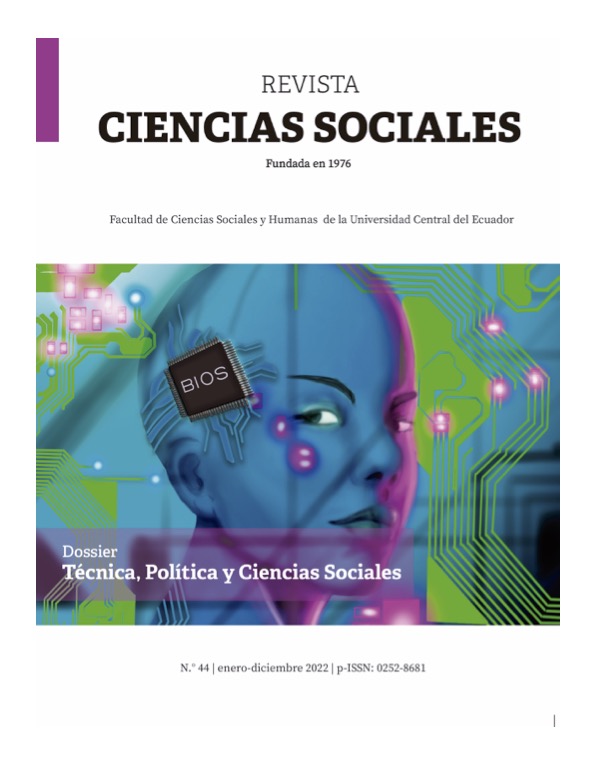The metaphysics of the mechanical image of the world
DOI:
https://doi.org/10.29166/csociales.v1i44.4186Keywords:
Technique, science, politics, modernity, metaphysics, government, deviceAbstract
This article develops the fundamental lines of what I have called, following in the open road of Martin Heidegger, the "destruction of the metaphysics of the mechanical image of the world". To do so, it first shows the essential relationship between our understanding of technique and the meaning of the modern epoch. In this order of ideas, the problem of the type of link that we should recognize between modern technology and science is developed. With all these items, we point out that, at the heart of the technoscientific project, is the Baconian idea that nature must be known in order to be mastered. The latter shows that, despite the undeniable and profound transformations of technoscience, especially since the twentieth century, there has been no comparable modification at the level of its metaphysical foundation. We conclude showing the basic suggestions of our thesis that technology must be seen today as politics.
Downloads
References
Adorno, Th., Horkheimer, M. (2007) [2013]. Dialéctica de la ilustración. Fragmentos filosóficos. En: Obra completa, 3. Madrid: Akal. Traducción: Joaquín Chamorro Mielke.
Agamben, G. (2014). Qué es un dispositivo. Buenos Aires: Adriana Hidalgo.
Bloch, E. (1977). El principio esperanza. T. II. Buenos Aires: Editorial Aguilar. Traducción: Felipe Gonzáles Vicen.
Blumenberg, H. (2013). Historia del espíritu de la técnica. Traducido por Pedro Madrigal. Valencia: Pre-textos.
Canguilhem, G. (1971). Lo normal y lo patológico (Ricardo Potschart, trad.). Buenos Aires: Siglo XXI.
Dussel, E. (2014). Modernidad y ethos barroco en la filosofía de Bolívar Echeverría. En: Dominación y resistencia en Bolívar Echeverría. Quito: UASB/Corporación Editora Nacional/DGE-Equilibrista.
Echeverría, B. (2010a) [2013]. Definición de la Cultura. México: FCE.
Echeverría, B. (2010c) [2015]. Un concepto de “modernidad”. En: Siete aproximaciones a Walter Benjamin. Bogotá: Ediciones desde abajo.
Echeverría, B. (2011). Modernidad y capitalismo (15 Tesis). En: Discurso crítico y modernidad. Bogotá: Ediciones desde abajo.
Feenberg, Andrew (2005). Teoría crítica de la tecnología. En: Revista CTS, nº5, vol.2 (pp. 109-123). Recuperado de: https://dialnet.unirioja.es/descarga/articulo/2358086.pdf
Foucault, M. (2008). Vigilar y castigar. Nacimiento de la prisión. Buenos Aires: Siglo XXI. Traducción: Aurelio Garzón del Camino.
Heidegger, M. (1971). El ser y el tiempo. México: Fondo de Cultura Económica.
Heidegger, M. (1998). La época de la imagen del mundo. En: Caminos del bosque (pp.63-90). Madrid: Alianza Editorial.
Heidegger, M. (2007). La pregunta por la técnica. En: La pregunta por la técnica (y otros textos). Barcelona: Folio. Traducción: Eustaquio Barjau.
Heidegger, M. 1985. Serenidad. Traducido por: Luís Brea Franco. Recuperado de: https://repositorio.unphu.edu.do/bitstream/handle/123456789/522/Serenidad.pdf?sequence=1&isAllowed=y
Heidegger, M. 1997. Ciencia y Meditación. En: Filosofía, ciencia y técnica, pp. 149- 180. Santiago de Chile: Editorial Universitaria.
Heidegger, M. 1997. La vuelta (Die Kehre). En: Filosofía, ciencia y técnica, pp. 181- 196. Santiago de Chile: Editorial Universitaria.
Horkheimer, M. (2010). Crítica de la razón instrumental. Madrid: Trotta.
Jonas, H. (1995). El principio de responsabilidad. Ensayo de una ética para la civilización tecnológica. Barcelona: Editorial Herder. Traducción: Andrés Sánchez Pascual.
Lamm, E. (2017). “Prácticas prohibidas: la alteración genética”. En: DELS. Recuperado de: https://salud.gob.ar/dels/entradas/practicas-prohibidas-alteracion-genetica
Marcuse, H. (2016). El hombre unidimensional. Barcelona: Austral/Ariel.
Marinho, H. y Ries, C. (2019). Minerales espaciales: cosas de nadie en beneficios de todos. Derecho PUCP. Revista de la Facultad de Derecho, nº83, pp.89-131. Recuperado de: https://doi.org/10.18800/derechopucp.201902.004
Marx, K. (1979b). El capital. Crítica de la Economía Política. Tomo I, Vol. II. México: Siglo XXI.
Mumford, L. (1955). Technics and Civilization. Londres: Routledge & Kegan Paul Ltd.
Mumford, L. (2016). El pentágono del poder. El mito de la máquina, dos. La Rioja: Pepitas de calabaza ed.
Sibilia, P. (2009). El hombre posorgánico. Buenos Aires: Fondo de Cultura Económica.
Stiegler, B. (2002). La técnica y el tiempo 1. El pecado de Epimeteo. País Vasco: Editorial Hiru. Traducción: Beatriz Morales Bastos.
Wiggershaus, R. (2015). La Escuela de Fráncfort. México: FCE.
Downloads
Published
How to Cite
Issue
Section
License
Copyright (c) 2023 Martín Aulestia Calero

This work is licensed under a Creative Commons Attribution-NonCommercial-NoDerivatives 4.0 International License.
Política de acceso abierto
La revista Ciencias Sociales adhiere al modelo Acceso Abierto en el que los contenidos de las publicaciones científicas se encuentran disponibles a texto completo libre y gratuito en Internet, sin embargos temporales, y cuyos costos de producción editorial no son transferidos a los/las autores/as.
En ese sentido, no existe costo alguno para los/as autores/as en el envío o durante el proceso editorial, defendiendo el derecho a la información con equidad e iguales oportunidades de acceso.
Licencia y derechos de autor/a
Los autores conservan todos los derechos de publicación del artículo y conceden a la Revista Ciencias Sociales una licencia no exclusiva, intrasferible y sin regalías por duración ilimitada para su reproducción, distribución y comunicación pública a nivel mundial bajo una Licencia Creative Commons Atribución 4.0 Internacional (CC BY NC 4.0)


